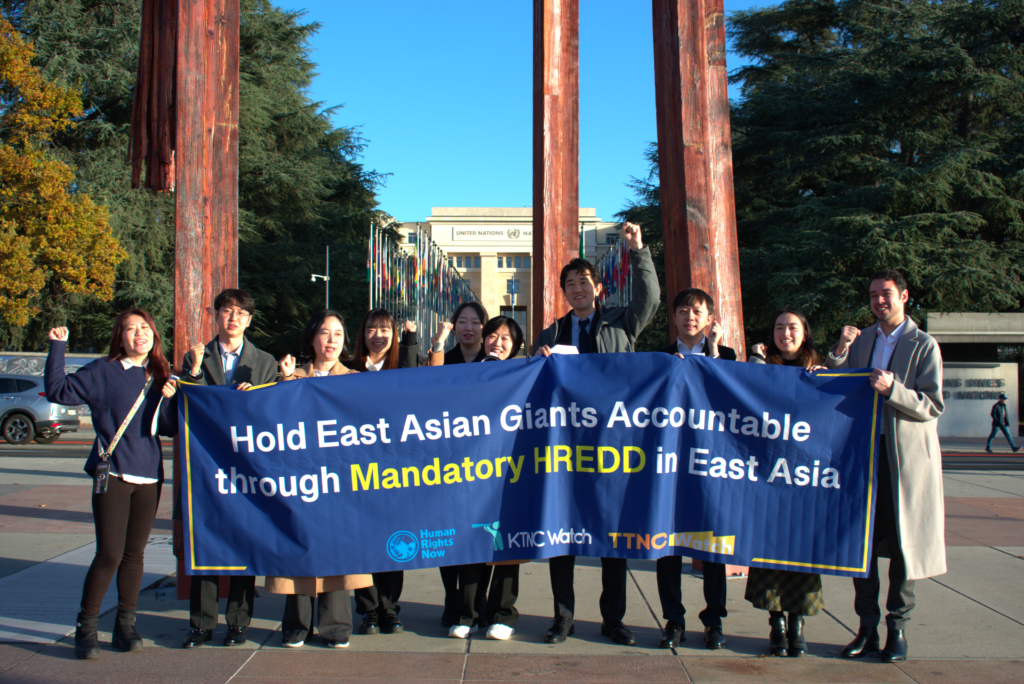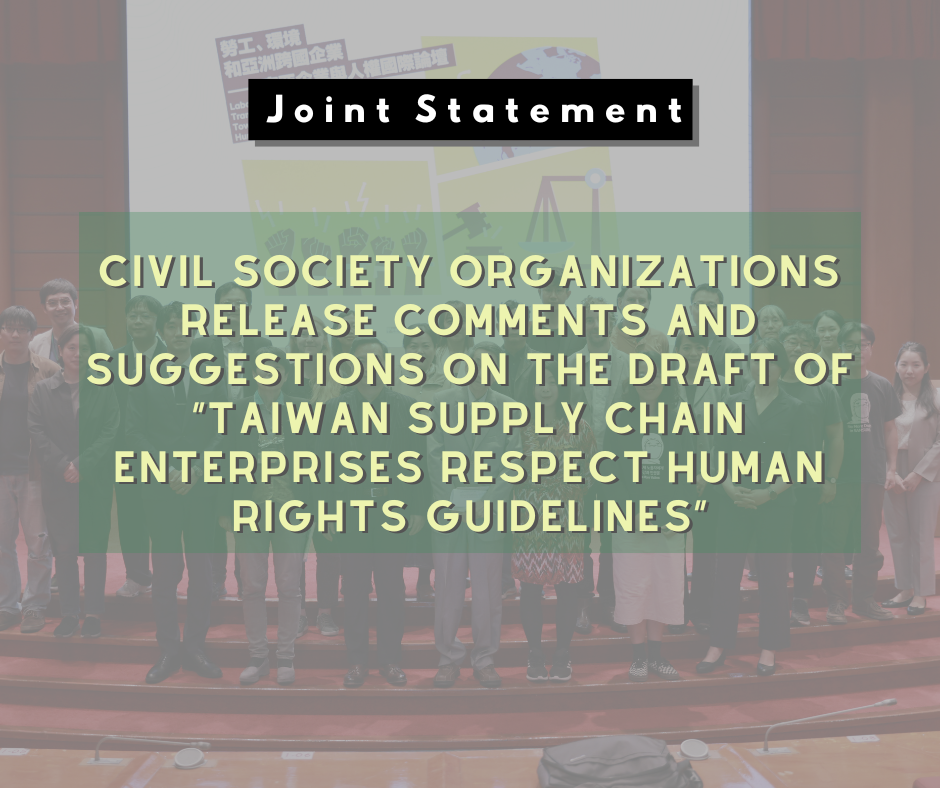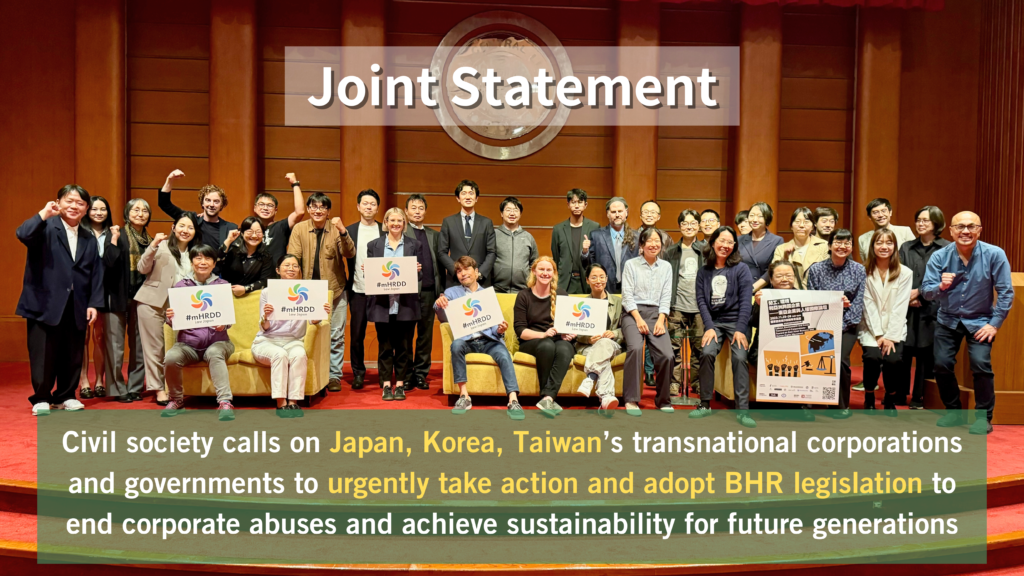Japanese, South Korean, Taiwanese, and the other international CSOs call on the UN and EU decision makers to support the Mandatory Human Rights and Environmental Due Diligence(mHREDD) legislation in East Asia to close loopholes enabling human rights and environmental abuses in global supply chains.
We, undersigned CSOs, including human rights and environmental NGOs from around the world, call on EU decision makers and global leaders to support the adoption of effective mHREDD legislations in our respective countries to better ensure human rights and environmental rights protections in global supply chains.
While the EU’s groundbreaking CSDDD (Corporate Sustainability Due Diligence Directive) adopted in May 2024 reaches beyond its borders, it has its limitations due to the high threshold for scope and implementation which still needs to be tested. Japanese, South Korean and Taiwanese businesses play key roles in the global supply chains, in particular the garment industry, long distance fishing, electronics, semiconductors and increasingly the battery industry. Therefore, to transform a larger share of business practices globally, it is imperative that Japan, South Korea and Taiwan put in place effective mandatory human rights and environmental due diligence laws to hold their businesses accountable, regardless of their annual turnover generated in the EU.
These laws must be binding and aligned with international standards, for instance the UNGPs and The OECD Guidelines for Multinational Enterprises on Responsible Business Conduct in content. Prevention must be the main objective of mHREDD laws. Stakeholder engagement, especially with vulnerable rights holders, must be meaningful and ongoing.
At the same time, we recognise that mHREDD is not a silver bullet, or a one-size-fits-all solution. It must be complemented with international frameworks and the strengthening of national laws. However, this does not justify the absence of mHREDD legislation. MHREDD legislation is the key component for effective HREDD practice.
We call on the governments of Japan, South Korea and Taiwan, to fulfil their obligations to protect human rights under the UNGPs and UN human rights covenants, to urgently enact the mHREDD legislation to ensure businesses within their jurisdiction respect human rights and the environment throughout their business operations and supply chains, and that affected communities and victims have access to justice and remedies. State-owned companies and state-involved projects should lead by example and begin conducting human rights and environmental due diligence before the laws come into effect as the UNGPs states.
We urge Japanese, South Korean and Taiwanese companies to encourage their own governments to urgently enact mHREDD to protect human rights and the environment as well as to ensure the level playing field. At the same time, even without such legislation, we urge those companies to carry out human rights and environmental due diligence and engage with communities and stakeholders directly and ongoing, in line with international standards. Remediation and remedies must be provided when human rights and environmental harm occur. The three East Asian countries have declared themselves leaders in democracy and human rights in Asia. Now, they must prove that these are not just empty words through substantive legislation.
Finally, we call on the UN and EU decision makers to give more support for mHREDD legislation in East Asia to eliminate the loophole of the global market under mHREDD legislation and to protect human rights and the environment globally.
See the statement in pdf file here
Signatures:
・Accountability Counsel
・Action for Ecology and People Emancipation (AEER)
・Amnesty International Taiwan
・Asia Indigenous Peoples Network on Extractive Industries and Energy (AIPNEE)
・Asian Forum for Human Rights and Development (FORUM-ASIA)
・Canadian Network on Corporate Accountability
・Community Empowerment and Social Justice Network (CEMSOJ), Nepal
・CREA
・CSO Network Japan
・Ecodefense
・Gifu labor union
・Green Citizens’ Action Alliance
・International Corporate Accountability Roundtable (ICAR)
・International Federation for Human Rights (FIDH)
・Jamaa Resource Initiatives
・Japan National Assembly of Disabled Peoples’ International
・Japan NGO Center for International Cooperation (JANIC)
・Manushya Foundation
・Nijiiro Diversity
・OECD Watch
・Oyu Tolgoi Watch
・Perkumpulan Pegiat Kesehatan Masyarakat (SAFETY)
・Reproductive Research Executive Committee
・Rights CoLab
・Rivers without Boundaries Coalition Mongolia
・Solutions for Our Climate
・Südwind Association
・Taiwan Association for Human Rights
・Taiwan Labour Front
・Urgewald
・Matthew Coghlan(Business & Human Rights Consultant)



